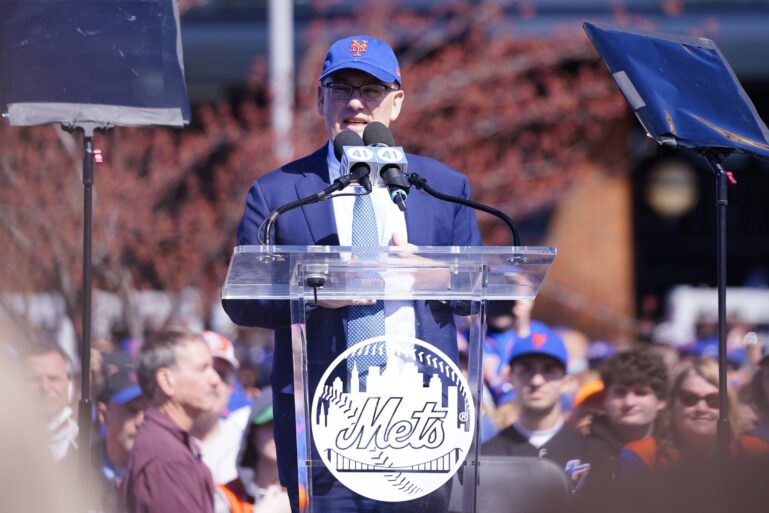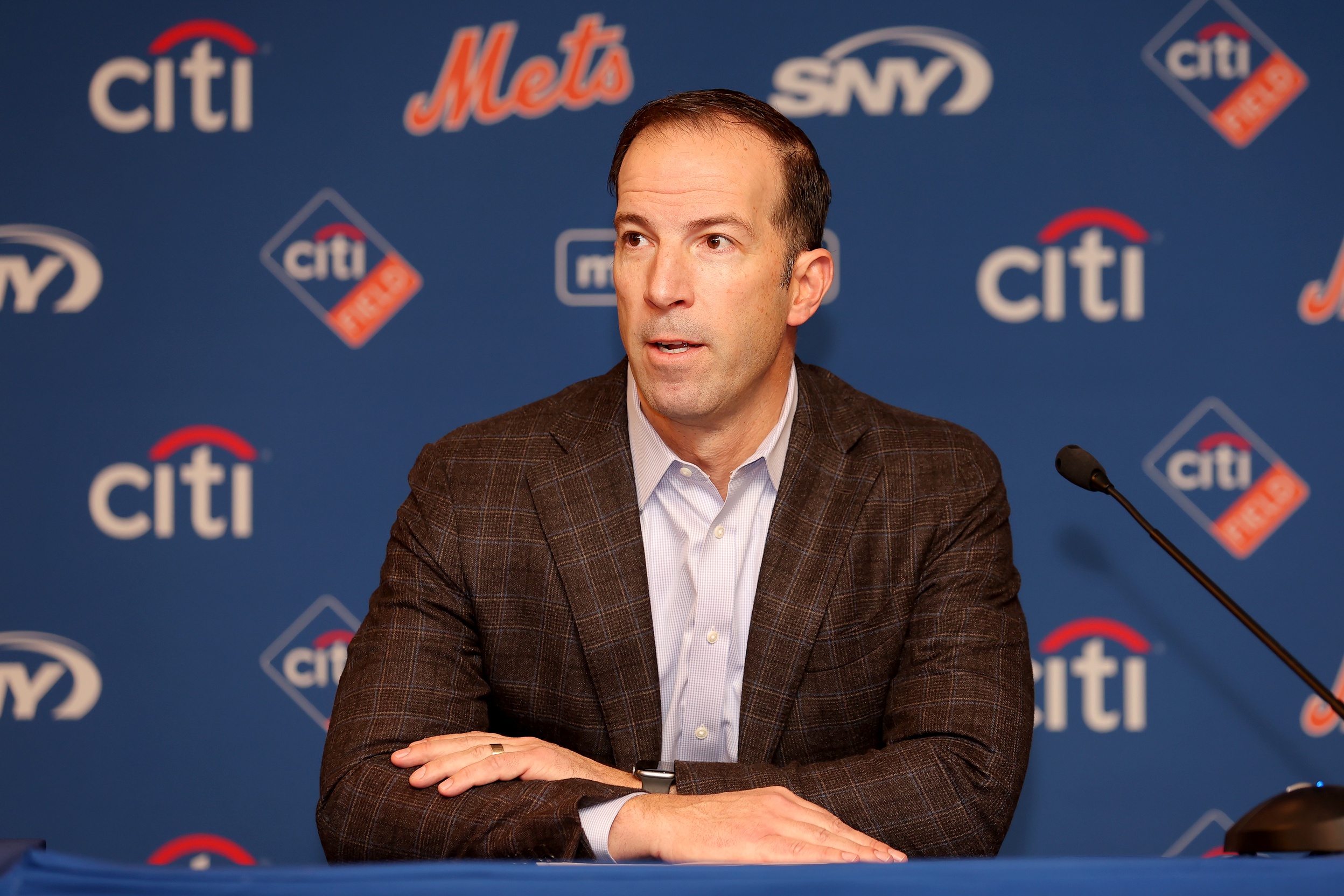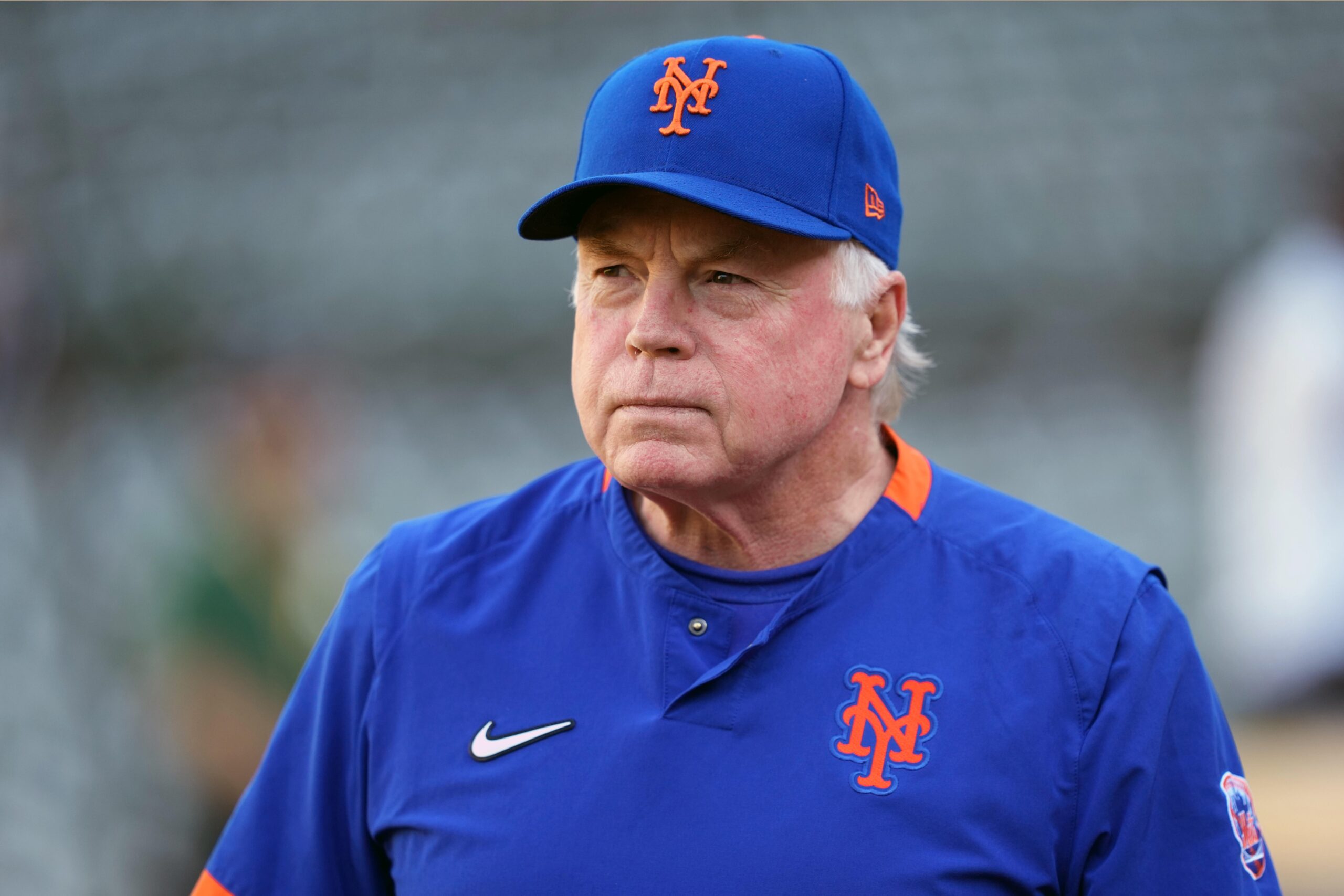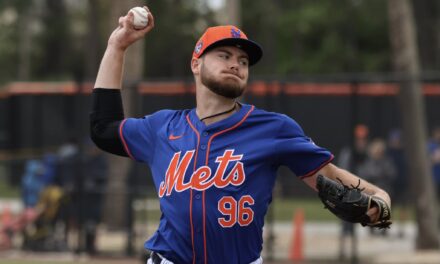Heading into Steve Cohen’s press conference yesterday, many New York Mets fans were ready to eviscerate him, almost regardless of what he said. Short of firing Billy Eppler, Buck Showalter, Jeremy Barnes, Jeremy Hefner, and the food vendors for the Brooklyn Cyclones, it was bound to be a bloodbath.
However, in an unusually candid (for an owner) interview, Cohen laid forth his direction for the Mets going forward. I was not expecting to be impressed by what I heard, but I actually liked many of the points the Mets owner made. In his words, he showcased both the vision he had for the team when he originally bought it and the adjustments in his thinking moving forward.
Although it may seem that he did not say anything that earth-shattering, here are some of my takeaways from Cohen’s presser.

Steve Cohen. Gregory Fisher-USA TODAY Sports
He Has a Long-Term Vision
Overall, Cohen knows where he wants to take this team. He walked back his three-to-five-year timeline for a World Series somewhat, admitting that it’s difficult to actually win and the best you can do is get into the dance. But as much as he still wants to win now, he has a vision to build sustainable success.
For example, Cohen pointed to the fact that the Mets are just starting to build their pitching lab now, while other teams have had theirs in place for nearly a decade. Not only does that put the Mets’ minor league pitchers behind the eight-ball, but it also doesn’t help their struggling major leaguers. Cohen pointed out that the team has not developed its own pitchers for a long time, and that needs to change for the Mets to become winners. However, he also knows it’s going to take time.
Cohen’s goal is to turn the Mets into a perennial contender like the Astros, Braves, and Dodgers. While those teams differ slightly in their willingness to foray into free agency and spend big, all three have developed a lot of their own talent and churned out a number of stars from their farm systems. That didn’t happen overnight for those organizations, and it won’t happen overnight for the Mets, either.

Brad Penner-USA TODAY Sports
His Patience is Calculated, Too
I liked what Cohen said about his reasoning for not firing Eppler and Showalter. Who wants to work for an owner who won’t give his guys a chance? Although the pressure to win in New York is immense, any talented executive is going to want reassurance that he has the chance to implement his vision. In the book Caponomics, which discusses the NFL salary cap, author Zack Moore states that in all professional sports, the tandem of general manager and coach needs at least five years together to fully get their vision in place, from philosophy to coaches to players and then to the finer details. Though the timelines may be different for baseball, this is the way to sustain success—not just attain it immediately.
I still believe that Eppler and Showalter are not the right people to make that vision happen. However, showing at least enough patience to see the season through before making a move will likely benefit Cohen in the long run. Although I originally felt that he was being patient just for the sake of not being labeled as George Steinbrenner 2.0, his words show that there is reasoning behind it.
He is Not a Reckless Spender
Many have tabbed Cohen as the next Steinbrenner with a similar willingness to spend indiscriminately. Although that was fairly evident from the players he both did and did not acquire over the last three offseasons, his comments further demonstrated that he is willing to spend in a calculated manner.
About the team’s payroll, Cohen said, “I don’t think it’s sustainable in the long term, just losing the type of money that I’m losing. It’s a lot to ask… I have the wherewithal to do it. And it’s just a question of how long.”
Some will scoff at the billionaire claiming that a ballooning payroll is unsustainable. However, I don’t believe that he meant his personal financial situation, even though he said the money that he is losing. What Cohen was saying was that running a baseball team that is reliant on overpaying in free agency is not a formula for winning.
In other words, even when Cohen spent all that money in free agency, it was not with the intention to keep doing so forever. He wanted to make the Mets winners in the short term and mostly signed short-term contracts toward that end (Francisco Lindor notwithstanding, and perhaps Starling Marte, as well). His longer-term vision, though, remains to become a team that builds through their farm system and supplements through free agency.
When asked if he regrets spending all the money he did in free agency, Cohen responded, “Let’s say this turns out to be a poor season, in retrospect, yeah, you’d like to spend less. But you don’t have that luxury when you’re trying to put together a team. That’s the decision we made. Free agency is really expensive. If you want to field a good team from free agency, that’s what it costs.” He admitted that the cost is also magnified by the iffy proposition of getting what you expect out of the players and reiterated that the long-term goal is to build up the farm system.
Clearly, Cohen’s vision of success with the free agents he signed is not working this year. But that leads to the next point.
He Will Use Sunk Costs to Get Better
Last week, the Mets traded Eduardo Escobar to the Angels and paid down the maximum salary that MLB will allow in order to get a greater prospect haul. Cohen was asked if he will continue to do such things. His answer was telling: “I consider it money spent.”
This is the antithesis of the sunk-cost fallacy and an excellent way to approach team-building. Not every team has the luxury of paying down a player’s salary, but Cohen has the money to do so. Unlike many other owners and decision-makers across the business spectrum, when he made a mistake, he’s willing to swallow it to get better.
I criticized Billy Eppler very heavily in the past for refusing to admit his mistakes in trades, specifically with Darin Ruf (and even, to an extent, Daniel Vogelbach). I saw him as a purveyor of the sunk-cost fallacy. However, on a broader level, it appears that Cohen understands the issue and is willing to put his money where his mouth is.
If the Mets want to build up their farm system, then giving up talented but expensive players while picking up the tab should net them a superior return. Since many of their prospects are still several years away with uncertain developmental curves, perhaps the Mets can build the upper levels of their system this way.
In the same vein, I was happy to hear Cohen say that if he is in the same position at the trade deadline then he will not be buying. His words made it clear that if the Mets don’t improve, he will sell. He does not want that to happen, but he’s not going to play the middle-of-the-road mediocrity card that the Wilpons so often did.

Darren Yamashita-USA TODAY Sports
What I Still Want to See
Prior to this press conference, I was fully prepared to write an article stating that Cohen made his own bed by trying to put a Band-Aid over a wound. After hearing him speak, I realize that he recognizes there is a lot of work to be done and that the team’s success will not come overnight.
However, there are still a few points that I would like to see changes with, and those pertain to the 2023 Mets as well as the future.
Analytics Overhaul
I find that the team’s analytics department is very outdated. When Tommy Pham explained that the analytics team told Showalter that he should sit against right-handed pitching, that was emblematic of so many of the issues we’ve seen with the team’s lineups and decision-making in-season and in-game.
There is too much of a focus on handedness over actual splits, too much of an emphasis on on-base percentage vs. weighted on-base average (wOBA), and not enough recognition that the power vs. strikeout tradeoff is worthwhile to win. As an analytically minded writer, I find these issues ongoing and infuriating. If Cohen truly wants to improve this team, he needs to get his analytics department up to par from the lowest levels of the minors on up.
Player Development
In concert with that, the Mets must build up their player development and coaching. The fact that so many Mets players fall into prolonged slumps at the same time and cannot break out of it is concerning. When it happens in one season, it can be considered fluky, but this is the second time in three seasons that over half the Mets lineup are performing far below their norms. That they can’t figure it out speaks to something within the organization.
Baseball is a tough sport to figure out. Players do go into prolonged slumps or have off years. Witness players like Carlos Correa and Trea Turner, megastars at their positions who started off this season being unable to buy a hit. However, when it seems to happen team-wide, the question is why there is no one to help them break out of it.
Similarly, Brett Baty‘s struggles to elevate the ball and Francisco Álvarez‘s recent slump raise questions about what the Mets are doing to help them. Again, young players do struggle at times (see: Jarred Kelenic). However, these are two very talented hitters who have shown flashes of the players they can be. It seems to me that there may be a systemic hitting approach that is not allowing these players to maximize their potential, whether it’s an overemphasis on walks and avoiding strikeouts or something else.
To me, these are things Cohen still needs to identify and endeavor to fix. Perhaps the president of baseball operations that he seeks will be in charge of that. David Stearns comes from the Astros’ management pipeline and will likely have a good understanding of these issues. If it’s not Stearns, though, whoever Cohen puts in place must have more than old-school approaches to the team’s current problems.
Overall, I was encouraged by what I heard from Cohen even if many others seem to feel the same as before. It may be too late to turn things around for the 2023 team, but I’m confident that there’s a vision going forward that has a good chance of paying off in the long term.















